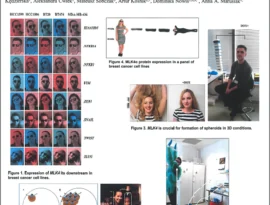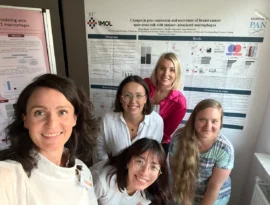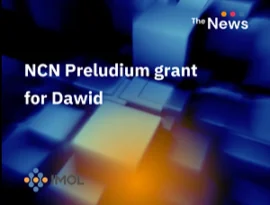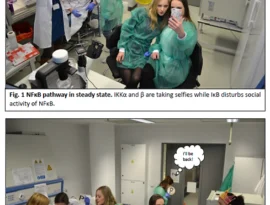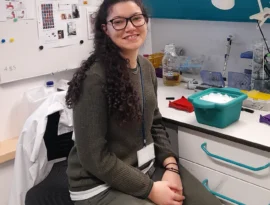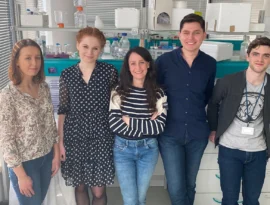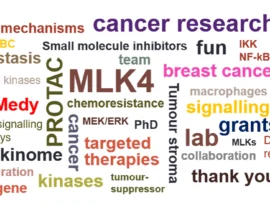1st Poster Prize, 20th Warsaw International Medical Congress, „Basic & Preclinical Science Session”, Alicja Mazan-Bury

Anna Marusiak, PhD
Laboratory of Molecular OncoSignalling
ORCID ID: 0000-0001-8907-3131
- RESEARCH
- MEMBERS OF THE GROUP
- PUBLICATIONS
- GROUP LEADER
- MORE
Research interests
The Laboratory of Molecular OncoSignalling focuses on cancer biology, cellular signaling during oncogenesis, and the identification of novel targets for cancer therapies.
Signal transduction plays a critical role in cancer development. Protein kinases, as master regulators of signaling pathways, represent key targets in cancer treatment. Our group is dedicated to understanding how aberrant signaling in cancer cells contributes to tumor development, metastasis, and therapy resistance, as well as leveraging this knowledge to design innovative anticancer treatments.
In particular, we investigate oncogenic signaling activated by MLK4 in breast cancer. MLK4, a member of the Mixed-Lineage Kinase family of serine/threonine kinases, is activated by environmental stress, cytokines, and growth factors, influencing various cellular processes. Members of the MLK family are implicated in the regulation of numerous disorders, including cancer, inflammation, metabolic diseases, and neurobiological disorders. In our lab, we study MLK4 signaling in breast cancer, where its high upregulation drives malignant progression. One of our key projects aims to elucidate the role of MLK4 in the response to chemotherapy in breast cancer. Furthermore, we are committed to developing and validating the potency and efficacy of first-in-class MLK4-targeting compounds. We also explore the significance of MLK4-dependent crosstalk between tumor microenvironment components and breast cancer cells.
Our studies employ human and mouse cancer cell lines, as well as syngeneic and xenograft tumor models in mice. We utilize advanced methodologies, including 3D cell cultures, flow cytometry, mass spectrometry, and various phenotypic assays such as invasion and migration assays.
Members of the group
| Name | Surname | Degree | |||||
| Łukasz | Biegała | PhD | l.biegala@imol.institute | ||||
| Kamila | Karpińska | PhD | k.karpinska@imol.institute | ||||
| Anna | Marusiak | PhD | a.marusiak@imol.institute | ||||
| Alicja | Mazan-Bury | a.mazan@imol.institute | |||||
| Dawid | Mehlich | MD | d.mehlich@imol.institute | ||||
| Zuzanna | Sas | PhD | z.sas@imol.institute | ||||
| Vi Nguyen Phuong | Trương | v.truong@imol.institute | |||||
| Former members | |||||||
| Dagmara | Dymerska-Zaremba | PhD | d.dymerska@imol.institute |
Publications
- Zakrzewski, M., Sas, Z., Cocom-Chan, B., Firdaus, M. E. R., Kałek, M., Szczepanowska, K., Gerlach, P., Marusiak, A., & Serwa, R. A. (2025). Profiling polyamine-protein interactions in live cells through photoaffinity labeling. RSC chemical biology, 10.1039/d5cb00103j. Advance online publication. https://doi.org/10.1039/d5cb00103j
- Katerji, M., Bergman, K. L., Lindberg, E., Rubin, M. R., Funk, A. L., Woodroofe, C. C., Nyswaner, K., Karpińska, K., Serwa, R., Marusiak, A., Swenson, R. E., & Brognard, J. F. (2025). Discovery of potent and selective PROTACs for the protein kinase LZK for the treatment of head and neck cancer. The Journal of biological chemistry, 108452. https://doi.org/10.1016/j.jbc.2025.108452
- Funk, A. L., Katerji, M., Afifi, M., Nyswaner, K., Woodroofe, C. C., Edwards, Z. C., Lindberg, E., Bergman, K. L., Gough, N. R., Rubin, M. R., Karpińska, K., Trotter, E. W., Dash, S., Ries, A. L., James, A., Robinson, C. M., Difilippantonio, S., Karim, B. O., Chang, T. C., Chen, L. Xu, X., Doroshow, J., Ahel, I., Marusiak, A., Swenson, R., Cappell, S., Brognard, J. (2025). Targeting c-MYC and gain-of-function p53 through inhibition or degradation of the kinase LZK suppresses the growth of HNSCC tumors. Science signaling, 18(873), eado2857. https://doi.org/10.1126/scisignal.ado2857
- Karpińska, K., Mehlich, D., Sabbasani, V. R., Łomiak, M., Torres-Ayuso, P., Wróbel, K., Truong, V. N., Serwa, R., Swenson, R. E., Brognard, J., & Marusiak, A. A. (2024). Selective Degradation of MLK3 by a Novel CEP1347-VHL-02 PROTAC Compound Limits the Oncogenic Potential of TNBC. Journal of medicinal chemistry, 67(17), 15012–15028. https://doi.org/10.1021/acs.jmedchem.4c00577
- Torres-Ayuso, P., Katerji, M., Mehlich, D., Lookingbill, S. A., Sabbasani, V. R., Liou, H., Casillas, A. L., Chauhan, S. S., Serwa, R., Rubin, M. R., Marusiak, A. A., Swenson, R. E., Warfel, N. A., & Brognard, J. (2024). PIM1 targeted degradation prevents the emergence of chemoresistance in prostate cancer. Cell chemical biology, 31(2), 326–337.e11. https://doi.org/10.1016/j.chembiol.2023.10.023
- Mazan, A., & Marusiak, A. A. (2024). Protocols for Co-Culture Phenotypic Assays with Breast Cancer Cells and THP-1-Derived Macrophages. Journal of mammary gland biology and neoplasia, 29(1), 4. https://doi.org/10.1007/s10911-024-09556-2
- Dymerska, D., & Marusiak, A. A. (2024). Drivers of cancer metastasis – Arise early and remain present. Biochimica et biophysica acta. Reviews on cancer, 1879(2), 189060. https://doi.org/10.1016/j.bbcan.2023.189060
- Wysocki, P. T., Czubak, K., Marusiak, A. A., Kolanowska, M., & Nowis, D. (2023). lncRNA DIRC3 regulates invasiveness and IGF signaling in thyroid cancer cells. Endocrine-related cancer, ERC-23-0058. Advance online publication. https://doi.org/10.1530/ERC-23-0058
- Mehlich, A., Bolanowski, M., Mehlich, D., & Witek, P. (2023). Medical treatment of Cushing’s disease with concurrent diabetes mellitus. Frontiers in endocrinology, 14, 1174119. https://doi.org/10.3389/fendo.2023.1174119
- Mehlich, D., & Marusiak, A. A. (2022). Kinase inhibitors for precision therapy of triple-negative breast cancer: Progress, challenges, and new perspectives on targeting this heterogeneous disease. Cancer letters, 547, 215775. https://doi.org/10.1016/j.canlet.2022.215775
- Mehlich, D., Łomiak, M., Sobiborowicz, A., Mazan, A., Dymerska, D., Szewczyk, Ł. M., Mehlich, A., Borowiec, A., Prełowska, M. K., Gorczyński, A., Jabłoński, P., Iżycka-Świeszewska, E., Nowis, D., & Marusiak, A. A. (2021). MLK4 regulates DNA damage response and promotes triple-negative breast cancer chemoresistance. Cell Death & Disease, 12(12), 1111. https://doi.org/10.1038/s41419-021-04405-0
- Inhibition of the ʟ-glutamine transporter ASCT2 sensitizes plasma cell myeloma cells to proteasome inhibitors Monika K. Prelowska, Dawid Mehlich, M. Talha Ugurlu, Hanna Kedzierska, Aleksandra Cwiek, Artur Kosnik, Klaudia Kaminska, Anna A. Marusiak, Dominika Nowis, Cancer Letters, 2021
- Differential responses to kinase inhibition in FGFR2-addicted triple negative breast cancer cells: a quantitative phosphoproteomics study. Debbie L. Cunningham, Adil R. Sarhan, Andrew Creese, Katherine Larkins, Hongyan Zhao, Harriet Ferguson, Katie Baker, Anna A. Marusiak, Helen J. Cooper, John K. Heath. Scientific Reports, 2020
- Upregulation of MLK4 promotes migratory and invasive potential of breast cancer cells. Anna A. Marusiak*, Monika K. Prelowska, Dawid Mehlich, Michal Lazniewski, Klaudia Kaminska, Adam Gorczynski, Aleksandra Korwat, Olga Sokolowska, Hanna Kedzierska, Jakub Golab, Wojciech Biernat, Dariusz Plewczynski, John Brognard, Dominika Nowis. Oncogene, 2019
- Somatically mutated ABL1 is an actionable and essential NSCLC survival gene. Ewelina Testoni, Natalie L. Stephenson, Pedro Torres-Ayuso, Anna A. Marusiak, Eleanor W. Trotter, Andrew Hudson, Cassandra L. Hodgkinson, Christopher J. Morrow, Caroline Dive, John Brognard. EMBO Molecular Medicine, 2016
- Recurrent MLK4 loss-of-function mutations suppress JNK signalling to promote colon tumorigenesis. Anna A. Marusiak, Natalie L. Stephenson, Hayeon Baik, Eleanor W. Trotter, Yayong Li, Karen Blyth, Susan Mason, Phil Chapman, Lorena A. Puto, Jon A. Read, Claire Brassington, Helen K. Pollard, Chris Phillips, Isabelle Green, Ross Overman, Matthew Collier, Ewelina Testoni, Crispin J. Miller, Tony Hunter, Owen J. Sansom, John Brognard. Cancer Research, 2016
- Paradox-breaking BRAF inhibitors are effective in melanomas that are resistant to BRAF-selective or BRAF plus MEK inhibitor combinations. Maria R. Girotti, Filipa Lopes, Natasha Preece, Dan Niculescu-Duvaz, Alsonso Zambon, Lawrence Davies, Steven Whittaker, Grazia Saturno, Amaya Viros, Malin Pedersen, Bart M.J.M. Suijkerbuijk, Delphine Menard, Robert McLeary, Louise Johnson, Laura Fish, Sarah Ejiama, Berta Sanchez-Laorden, Neil Oliver Carragher, Kenneth MacLeod, Garry Ashton, Anna A. Marusiak, Alberto Fusi, John Brognard, Margaret Frame, Paul Lorigan, Caroline Springer, Richard Marais. Cancer Cell, 2015
- Mixed lineage kinases activate MEK independently of RAF to mediate resistance to RAF inhibitors. Anna A. Marusiak, Zoe C. Edwards, Willy Hugo, Eleanor W. Trotter, Maria R. Girotti, Natalie L. Stephenson, Xiangju Kong, Michael G. Gartside, Shameem Fawdar, Andrew Hudson, Wolfgang Breitwieser, Nicholas K. Hayward, Richard Marais, Roger S. Lo, John Brognard. Nature Communications, 2014
- Targeted genetic dependency screen facilitates identification of actionable mutations in FGFR4, MAP3K9, and PAK5 in lung cancer. Shameem Fawdar, Eleanor W. Trotter, Yaoyong Li, Natalie L. Stephenson, Franziska Hanke, Anna A. Marusiak, Zoe C. Edwards, Sara Ientile, Bohdan Waszkowycz, Crispin J. Miller, John Brognard. PNAS, 2013
- Protein kinase C δ deficiency causes mendelian systemic lupus erythematosus with B-cell defective apoptosis and hyperproliferation. Belot A, Kasher PR, Trotter EW, Foray AP, Debaud AL, Rice GI, Szynkiewicz M, Zabot MT, Rouvet I, Bhaskar SS, Daly SB, Dickerson JE, Mayer J, O’Sullivan J, Juillard L, Urquhart JE, Fawdar S, Anna A. Marusiak, Stephenson N, Waszkowycz B, Beresford MW, Biesecker LG, Black GM, René C, Eliaou JF, Fabien N, Ranchin B, Cochat P, Gaffney PM, Rozenberg F, Lebon P, Malcus C, Crow YJ, Brognard J, Bonnefoy N. Arthritis Rheum., 2013
- Signal transducers and activators of transcription-3 binding to the fibroblast growth factor receptor is activated by receptor amplification. Anna A. Dudka, Steve M. Sweet, John K. Heath Cancer Research, 2010
- Narrative-based computational modelling of the Gp130/JAK/STAT signalling pathway. Maria L. Guerriero, Anna A. Dudka, Nicholas Underhill-Day, John K. Heath, C. Priami BMC Syst Biology, 2009
* corresponding author
About Group Leader
Anna Marusiak is a head of The Laboratory of OncoSignalling. After graduating from the University of Wrocław in medical biotechnology, she completed the PhD course in CRUK Growth Factor Group at the University of Birmingham under the supervision of Prof. John Heath. During 2011-2015 she was a postdoctoral fellow at the Cancer Research UK Manchester Institute in Signalling Networks in Cancer Group led by Dr John Brognard. In 2015 she joined Prof. Dominika Nowis’s (Laboratory of Experimental Medicine) at the Centre of New Technologies, University of Warsaw. She was a project leader of three grants (Fuga, Homing, Sonata). In August 2021, she became a group leader at IMol PAS.
Funding
- OPUS (National Science Centre), amount 2967 960 PLN, principal investigator
- SONATA BIS (National Science Centre), amount: 4 035 160 PLN, principal investigator.
- Excellence Initiative (IDUB) programme, project entitled: ”The combination of MLK4 inhibition and chemotherapy in animal studies” amount 50 600 PLN, principal investigator (gratefully declined).
- SONATA (National Science Centre), project entitled: “The importance of MLK4 signalling in the communication between breast cancer cells and tumour-associated macrophages”, amount 1 303 398 PLN, principal investigator.
- HOMING (Foundation for Polish Science), project entitled “The role of MLK4 amplification in breast cancer progression – studies in 3D cell culture and in vivo models”, amount 799 760 PLN, principal investigator.
- Travel Grant from Biochemical Society.
- Travel Grant from Cell Signaling Technologies.
- Fellowship for Outstanding Young Researchers from the Ministry of Science and Higher Education.
- FUGA (National Science Centre), project entitled “The effect of increased MLK4 expression on breast cancer progression”, amount 612 000 PLN, principal investigator.
- Socrates/Erasmus studentship, University of Reims, France
Lab members’ grants and awards
Poster Prize, 7th IBB Symposium for Young Investigators, Alicja Mazan
Fellowship for Outstanding Young Researchers from the Ministry of Science and Higher Education, Dawid Mehlich
START Fellowship (Foundation for Polish Science), Dawid Mehlich
PRELUDIUM (National Science Centre), principal investigator, Dawid Mehlich.
Fulbright Junior Research Award, Dawid Mehlich
Scholarship from the Polish National Agency of Academic Exchange, Dawid Mehlich
Lab’s life


